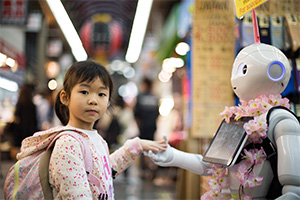Think
This week we have the partnership of Eva Maria Infante Deus, a third year student of Degree in Philosophy, Politics and Economics (PPE) who is doing an Erasmus program at the Universidade do Porto. She presents the dilemma that arises when thinking about the humanistic and technological world.
Can a machine come to think for us?
The universe of algorithms and automation is here to stay and is already part of our routine. Among the users who employ artificial intelligence (AI) are both the student who writes essays with ChatGPT's financial aid and the researcher that analyzes the possibility of prisoner recidivism through algorithms. This begs the question, can a machine really think for us?
 What machines can or cannot do depends largely on how they are programmed and, above all, what they are designed to do. When we talk about artificial intelligence, we cannot forget that machines are tools made by humans and that, in addition, they work with the data that we provide them with. This means that they not only help us to solve what they have been designed for, but that, for better or worse, in many cases they will do so by reproducing the same biases and patterns of their creators, people.
What machines can or cannot do depends largely on how they are programmed and, above all, what they are designed to do. When we talk about artificial intelligence, we cannot forget that machines are tools made by humans and that, in addition, they work with the data that we provide them with. This means that they not only help us to solve what they have been designed for, but that, for better or worse, in many cases they will do so by reproducing the same biases and patterns of their creators, people.
Strictly speaking, AI does not think or reflect, but rather translates and interprets the data that we provide it with and does not always do so correctly, either because the program employee is not perfect or because the data provided to it are insufficient or unrepresentative. Machines process information through algorithms and data and , although they can imitate some human cognitive functions, they are not able to think in the same way as the human species... As Jaime Nubiola pointed out in a recent article , AI can help us to go further, to make decisions in less time and to be more creative, but, for this, we will continue to need human reflection (Nubiola, 2023). While it can help us to think, it does not replace the exercise of thinking.
Artificial intelligence is neither infallible nor neutral, something that has been demonstrated by numerous programs of study (Kardoudi, 2023). In this sense, it is essential to establish ethical measures to ensure that the AI algorithms and systems we use are not subject to subjective assessments or biases. In addition, the consequences that the development of AI may have on certain areas of society should not be overlooked. For example: What will the labor market of the future look like? The development of AI is driving the creation of new jobs in fields such as management of data and programming, but it also harbors the risk of replacing workers in numerous sectors.
 In recent days, experts and intellectuals have order in an open letter to stop the implementation of artificial intelligence for six months to reflect on the ethical risks it may pose (Kardoudi, 2023). The technological revolution we are living through is going to change our daily lives in ways that we are not yet able to foresee. At times like this, it is vital that philosophers and experts, together with civil society, come together and debate the implications that AI may have on our society and the world around us. Perhaps a second question could be added to the question posed: how can artificial intelligence become a positive contribution to society?
In recent days, experts and intellectuals have order in an open letter to stop the implementation of artificial intelligence for six months to reflect on the ethical risks it may pose (Kardoudi, 2023). The technological revolution we are living through is going to change our daily lives in ways that we are not yet able to foresee. At times like this, it is vital that philosophers and experts, together with civil society, come together and debate the implications that AI may have on our society and the world around us. Perhaps a second question could be added to the question posed: how can artificial intelligence become a positive contribution to society?
The technological development is necessary and beneficial, but it must be adjusted to the needs of people and the environment. As a society, we need time to understand the changes we are living through and also to think more and better about how we want artificial intelligence to change the world we live in. The goal is to help technology, made by and for people, to have a positive impact on society and the world around us.
REFERENCES
Kardoudi, O. (2023, March 31). International experts call for stopping the development of artificial intelligence temporarily. elconfidencial.com. Retrieved from https://www.elconfidencial.com/tecnologia/novaceno/2023-03-29/inteligencia-artificial-chatgpt-regulacion-expertos_3601529/
Nubiola, J. (2023, March 24). ChatGPT nos financial aid a pensar más y mejor. unav.edu/opinion. Retrieved April 3, 2023, from https://www.unav.edu/opinion/-/contents/24/03/2023/chatgpt-nos-financial aid -a-pensar-mas-y-mejor/content/CnBM7sduyZOb/44637258.
If you liked the article, you might be interested in one of our Degrees!









